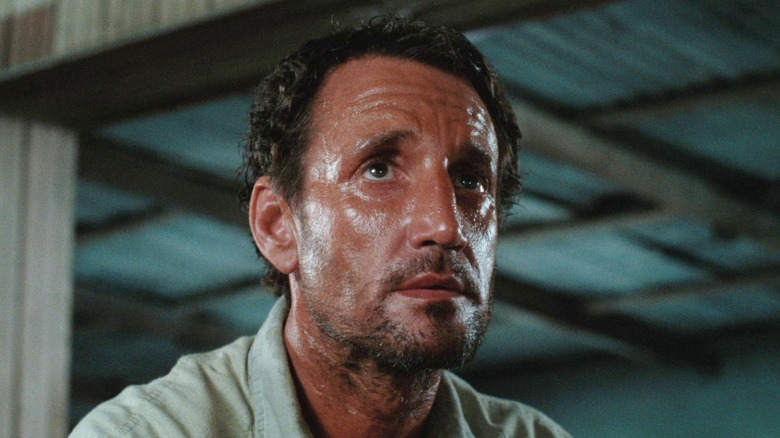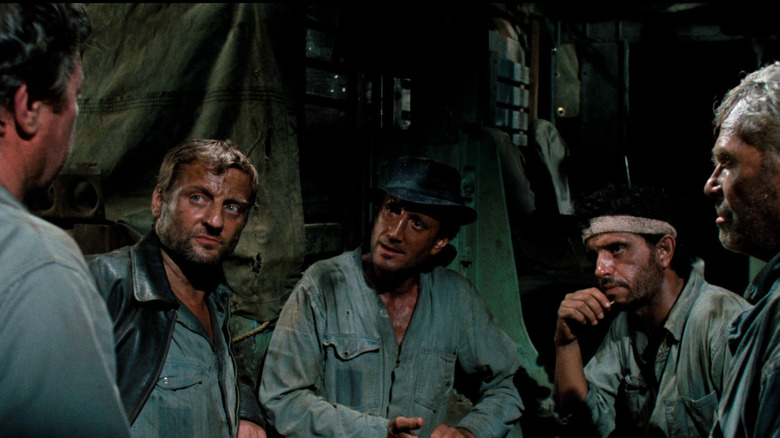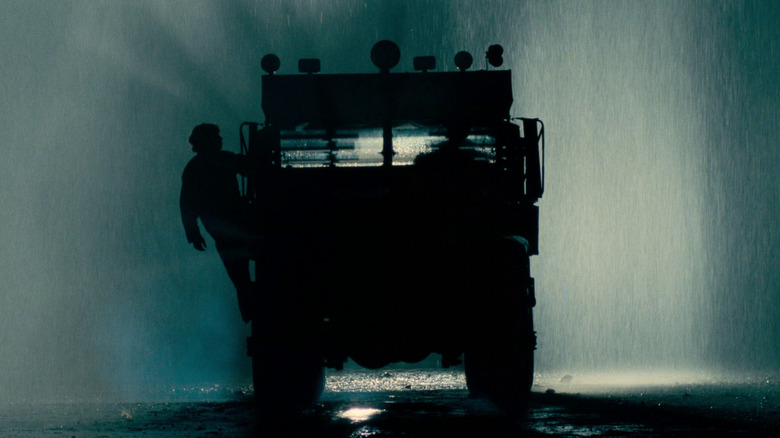Stephen King's 10 Favorite Movies Include One Of The Most Underrated Thrillers Of All Time
Everyone loves a good listicle, and celebrities sharing their favorite flicks is always fun, providing a glimpse into their personal tastes and perhaps what makes them tick as artists. Thanks to these tidbits, we now know that "Willy Wonka & the Chocolate Factory" inspired Salma Hayek Pinault to become an actor, and Johnny Depp wanted a tornado to carry him away from his teenage life after watching "The Wizard of Oz." Similarly, it comes as no surprise that a major mainstream filmmaker like Steven Spielberg tends toward good old-fashioned Hollywood storytelling, whereas Werner Herzog characteristically prefers esoteric documentaries that most people will have never heard about. But what about Stephen King, the prolific author whose works have inspired countless movie adaptations?
In September 2025, King revealed his 10 all-time favorite movies on X (formerly known as Twitter). Cheekily, he prefaced the list by noting that his picks excluded films based on his own novels, name-checking "Misery" and "The Shawshank Redemption" as examples, among a few others. (Unsurprisingly, though, he didn't mention Stanley Kubrick's "The Shining.") For the most part, King's choices are time-honored classics that reflect his passion for spinning a good yarn, including the likes of "Casablanca," "The Treasure of the Sierra Madre," "Double Indemnity," "The Godfather Part II," and "Jaws." Martin Scorsese's semi-autobiographical "Mean Streets" also made the cut over the director's big-hitters like "Taxi Driver," "Raging Bull," and "Goodfellas," which makes sense since King has also channeled a lot of his own life experiences into his work.
Meanwhile, "Close Encounters of the Third Kind" is his second Spielberg pick, which similarly checks out: It's a little light on narrative but more than makes up for that with its wondrous spectacle, with King having put his own darker spin on the idea of alien visitors in novels like "The Tommyknockers" and "Under the Dome." "Groundhog Day," however, is his only comedy choice, which is fair enough: Not only is it a great movie, but you can also see how the time loop scenario might appeal to a writer who regularly delves into the mysterious and the fantastical. Finally, the list is rounded out by two more surprising choices: Sam Peckinpah's "The Getaway" and William Friedkin's "Sorcerer." The latter is one of the most underrated thrillers of all time, but it was first on King's list, indicating he holds it in the highest regard. Let's take a closer look at why "Sorcerer" doesn't get the credit it deserves and why it is so special.
Sorcerer was largely forgotten after flopping at the box office
William Friedkin was on a hot streak in the 1970s. "The French Connection" was a big commercial success and won five Oscars, including Best Picture, Director, and Actor for Gene Hackman. Friedkin then followed that up with "The Exorcist," an even bigger box office smash that became the first horror movie to receive an Academy Award nomination for Best Picture. It also earned Friedkin a second consecutive nod in the Best Director category, but both he and the film lost out to George Roy Hill and "The Sting."
Those back-to-back successes made Friedkin one of the hottest directors of the decade. Sadly, however, he wasn't able to capitalize on that momentum and embarked on a string of unrealized projects. He started work on a documentary about horror cinema titled "A Safe Darkness," interviewing Fritz Lang and Roman Polanski in the process. He then bought the rights to Will Eisner's comic book series "The Spirit," but fell out with his screenwriter. On top of all that, he began developing a movie about UFOs called "The Devil's Triangle," with a view to cast Steve McQueen, Charlton Heston, and Marlon Brando.
The latter venture was shelved when Friedkin started working on his next completed picture, "Sorcerer." According to the director, the studio thought his sweaty remake of Henri-Georges Clouzot's "The Wages of Fear" could be another hit, but a perfect storm of problems spelled doom for the picture. Friedkin's intended star, Steve McQueen, dropped out and was replaced by Roy Scheider — a very capable actor coming off the back of "Jaws," but without the star power to sell a movie to audiences. It also didn't help that the title was confusing for many people, misleading them into expecting more supernatural action after "The Exorcist."
Most damagingly, though, "Sorcerer" came out a month after "Star Wars: Episode IV — A New Hope," an instant cultural phenomenon that Friedkin had passed on producing himself. In the summer of 1977, it seemed that nobody wanted a bleak existentialist thriller while George Lucas's breezy space adventure was still smashing box office records. As a result, "Sorcerer" flopped hard and signaled the beginning of the end for the auteur-led New Hollywood movement. Friedkin made some decent movies afterwards, but his career never fully recovered from that disappointment. Luckily, he kept faith in "Sorcerer," and it has gained a rightful reputation as a true classic in more recent decades.
Why Sorcerer is one of the best thrillers of all time
Stephen King is a master of keeping readers on the edge of their seat, so perhaps it's no surprise that he rates "Sorcerer" so highly. After all, the movie is centred around one of the most suspenseful conceits in cinema history: Four desperate men driving two battered trucks containing dynamite to seal an oil well blaze. The catch is that the highly-volatile explosives might blow up at the slightest jolt, and the route they must travel isn't exactly suited to a smooth ride.
Friedkin used a quasi-documentary style for both "The French Connection" and "The Exorcist," and he pushed the technique to the limit in "Sorcerer." He drops us right into a disorienting international prologue delivering the backstory for each man: Nilo (Francisco Rubal), a hired killer on the run after a hit in Mexico; Kassem (Amidou) a Palestinian rebel who flees from the Israel Defense Forces after detonating a bomb on a bus; and Victor Manzon (Bruno Cremer), a Parisian banker who leaves everything behind to escape arrest for fraud. Finally, we get some English dialogue as we meet the movie's nominal protagonist, Jackie Scanlon (Scheider), a New Jersey robber on the lam from the Mafia. Now, they're all holed up in an impoverished Latin American village without the means to emigrate somewhere better. That's when they are offered the dubious opportunity to make a little cash by transporting boxes of decaying dynamite 200 miles across the jungle.
"Sorcerer" is a slow burn that builds toward its show-stopping moment where the guys must drive the trucks across a decaying rope bridge over a swelling river in the middle of a violent storm. It is one of the most nail-biting sequences I've ever seen, as well as one that showcases Friedkin's filmmaking prowess. The sound design puts us right in the moment as the trucks growl and the bridge creaks and the storm howls around our ears. You can feel the immense weight of the trucks as they inch forward over rotting timber, and Friedkin ratchets up the tension until something finally snaps. The director went all-out for authenticity, driving real trucks through real jungles in the Dominican Republic to capture the scene. Taking his usual hands-on approach, Friedkin himself fell in the water while filming the bridge crossing, a set piece that alone makes "Sorcerer" one of the greatest thrillers ever made.


